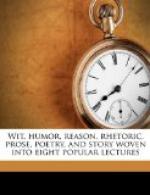It is the saloon that is on trial, not cranks, or moral idiots, or ministers. The saloon is charged with being the enemy of every virtue and ally of every vice, that it injures public health, public peace and public morals. The Supreme Court says: “No legislature has the right to barter away public health, public peace or the public morals; the people themselves cannot do so, much less their servants.”
In face of this declaration of the Supreme Court, legislators do barter away public health, public peace and public morals to the organized liquor traffic. All along the cruel career of this enemy of peace, health and morals, it has been pampered and petted by politicians who have been as much charmed by its promise of votes, as was Eve in the Garden of Eden by the serpent’s assurance. Deceived by the serpent of the still, they have not only disregarded the decision of the Supreme Court but defied God’s plan of dealing with sin. They have persisted in trying to regulate an irregularity in morals by licensing the greatest sin of the century, and have done so to their shame and failure in any regulation effort ever made. The only way to cure chills is to kill the malaria. The only way to cure the cursed liquor traffic is to cast it out of our civilization by a universal, everlasting prohibition of the manufacture, importation and sale of intoxicating liquor.
Rev. Howard Crosby, of New York, in advocating high license as a means of reducing the number of saloons, said in an address: “Suppose a tiger were to get loose in the city, would you not confine him to a few blocks rather than let him roam the city at large?” Some one in the audience answered aloud: “No Doctor, we would kill the tiger.”
How does regulation regulate? Take the city of Louisville, Ky., where I resided a number of years, and where I observed the practical working of the license system. Go there any Monday morning and you will see from twenty to forty men and women in the cage next to the Police Court room. A marshal stands at the door of the cage and takes them out one at a time. You will hear the judge say: “ten dollars and cost,” which means thirty days in the workhouse. Forty days pass and here is the same man in the Police Court: thirty days to serve his time, ten days to get a little money and then another drunk. Some do not know how many times they have been before the court. I was there one day when an Irishman was arraigned. The Judge said: “Pat, how many times have you been before this court?”
“Faith, and your books will tell ye,” replied the Irishman. Judge Price, the police judge at the time, said to me: “There are a number of men, and several women I know in this city, who pass through the courtroom on their way to the workhouse so regularly, I can guess within a few days of the time they will appear.” They pass like buckets at a fire, going up full and returning empty.




